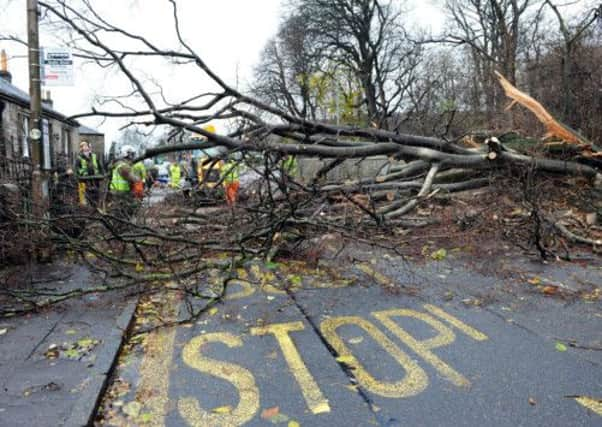Scotland’s weather: Clean-up operation begins


Tidal surges swept through the east coast of Britain, forcing thousands south of the border to evacuate their homes.
The storms, which claimed the lives of two people on Thursday, have been described as the “most serious” since the famous floods of 1953.
Both victims were named today.
Advertisement
Hide AdAdvertisement
Hide AdLorry driver Robert Dellow, 54, from Lowestoft, Suffolk, was travelling along the A801, one mile north of the Boghead Roundabout on Thursday morning when his HGV overturned and was then involved in a collision with other vehicles on the road.
Four other motorists suffered minor injuries and were taken to St John’s Hospital for treatment.
The pensioner killed after being struck by a tree in Retford, Nottinghamshire, was named as 83-year-old local man John Arthur White.
In Scotland, as the weather eased, engineers were working to restore power in the homes of thousands who had been left blacked out by the severe gales and heavy rain.
Energy companies said only a handful of households, those in very remote areas, were expected to spend a second night without electricity.
Returning to normal
Around 13,000 homes woke up without power this morning, but almost 130,000 were cut off at the height of the storms.
Meanwhile, transport services were returning back to normal service.
The majority of trains were back running after the entire Scottish network was closed for the first time in eight years because of trees, debris, and a trampoline.
Advertisement
Hide AdAdvertisement
Hide AdFerry operators said the majority of scheduled sailings were running, though passengers should still expect some delays. It was a similar scenario at major airports.
Scottish Hydro said about 7,500 of its customers were still without power on Friday afternoon – mainly in Argyll, the Highlands, the north east and rural Perthshire – but this would be down to “a handful” by late evening.
The company brought in catering vans to provide hot food and water in several communities, including Bellabeg, Foyers and Lumphanan.
Scottish Power said that 3,500 homes across its network was still without power yesterday lunchtime, having reconnected 46,500 properties since the storm began.
A total of 650 engineers were working on damaged power lines, including 150 drafted in from England.
Meanwhile, a yellow warning for snow continued in Grampian, the Highlands and parts of Tayside with Police Scotland warning drivers to beware of conditions, with drifting snow causing blizzards.
The snow gates at the Lecht were shut.
Schools closed
A scattering of schools across the north, north-east and Western Isles were also shut, including Inverness High School where parts of the roof had blown off. All but two in Shetland were closed.
In Stirling, three primary schools will remain closed because they have no power.
Advertisement
Hide AdAdvertisement
Hide AdGas engineers and council workmen worked throughout the night to prepare for emergency repairs to a sea wall in the Aberdeenshire town of Banff where a gas pipeline was exposed.
The wall in the Scotstown area was badly damaged in a storm surge last night. But there was no leak of gas from the exposed pipeline. There had been no need for any of the homes nearby to be evacuated.
Inverness was also mopping up after a day which saw the River Ness burst its banks where, ironically, £34million flood alleviation works are being carried out.
A winter wonderland event due to take place in Aberdeen’s Union Terrace Gardens last night was cancelled because of the weather on the grounds of public safety.
In Perthshire, teams cleared almost 300 trees so that the majority of roads were passable.
Neighbours
Meanwhile, police and local authorities were encouraging those vulnerable and elderly members of the community to contact them directly so appropriate assistance could be provided.
Anne Eadie, of British Red Cross, advised: “I would encourage people to keep an eye on their neighbours, particularly the elderly or infirm.
“We all need to look out for each other during the severe weather and make sure those less able than ourselves are not forgotten about, especially in such such adverse conditions and its after effects.”
Advertisement
Hide AdAdvertisement
Hide AdMaritime Rescue Coordination Centres (MRCCs) at Stornoway, Aberdeen, Humber, Holyhead, Liverpool, Thames, Dover and Falmouth have been managing the rescue efforts.
Nearly 50 Coastguard Rescue Teams were sent to some of the worst affected areas.
In Moray, they helped Scottish Fire and Rescue free 10 people trapped on a bus on a coastal road near Buckie. No one was hurt.
Richard Martin, Chief Coastguard, said: “Our Coastguards have worked tirelessly overnight to ensure the public stay safe and I’d like to thank them all for their effort in what have been difficult conditions.”
Despite the devastation caused, the Environment Agency said 800,000 homes had been protected by flood defences and better forecasting had given people “vital time” to prepare.
The agency, which had more than 50 severe flood warnings in place in England and Wales yesterday morning, added: “Significant flooding along the east coast of England is expected to continue today [Friday], as the most serious coastal tidal surge for over 60 years will continue to affect communities.”
A total of 9,000 people were evacuated their homes in Norfolk, mainly in the Great Yarmouth area. Soldiers helped the flood prevention effort in Essex and Norfolk.
The Environment Agency said 400 homes in the Humber region were affected by flood water on Thursday night In Kent, more than 500 properties were evacuated in areas including Sandwich, Seasalter, Faversham and the Medway towns
Advertisement
Hide AdAdvertisement
Hide AdConditions across the UK are expected to have improved by the weekend.
Gales and tidal surges have also hit parts of northern Europe, particularly Hamburg, with seven people reported to have been killed.